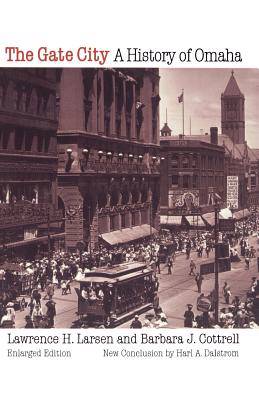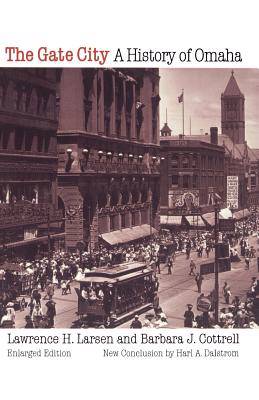
- Retrait gratuit dans votre magasin Club
- 7.000.000 titres dans notre catalogue
- Payer en toute sécurité
- Toujours un magasin près de chez vous
- Retrait gratuit dans votre magasin Club
- 7.000.000 titres dans notre catalogue
- Payer en toute sécurité
- Toujours un magasin près de chez vous
The Gate City
A History of Omaha (Enlarged Edition)
Lawrence H Larsen, Barbara J Cottrell Larson
Livre broché | Anglais
38,95 €
+ 77 points
Description
"Lawrence Larsen and his wife Barbara Cottrell have written a marvelous urban biography. They have done what other historians often fail to do-relate local happenings to the larger regional and national picture. And Larsen and Cottrell have skillfully used sophisticated historical works and concepts, incorporating them in an understandable fashion. Throughout this book the authors write in a delightful manner; they make you want to visit Omaha!"-North Dakota History. "[The authors] organize their splendid urban biography around a limited number of events of national magnitude. The husband-wife team take as their story's major units the building of the transcontinental railroad, the penetration of the Great Plains by homesteaders, the establishment of the meat packing industry, and the creation of an elaborate national defense system. They fill in their story with intriguing descriptions of the push-and-pull factors that brought diverse ethnic groups to Omaha in the years since 1854-the years when town promoters first settled at the Missouri River ferry landing in the newly established Nebraska territory. Because their narrative is so well organized, their treatment of political, social, and cultural affairs is clear and cohesive, while their discussion of urban unrest, vice, and crime remains tightly linked to the general outlines of their lively portrait of Omaha's history."-Business History Review. Lawrence H. Larsen is a professor of history at the University of Missouri-Kansas City. He is the author of The Urban South: A History (1990), Federal Justice in Western Missouri: The Judges, the Cases, the Times (1994), and other books. Barbara J. Cottrell is a historian with the NationalArchives-Central Plains Region. Harl A. Dalstrom is a professor of history at the University of Nebraska at Omaha.
Spécifications
Parties prenantes
- Auteur(s) :
- Editeur:
Contenu
- Nombre de pages :
- 356
- Langue:
- Anglais
Caractéristiques
- EAN:
- 9780803279674
- Date de parution :
- 01-07-97
- Format:
- Livre broché
- Format numérique:
- Trade paperback (VS)
- Dimensions :
- 135 mm x 194 mm
- Poids :
- 480 g







